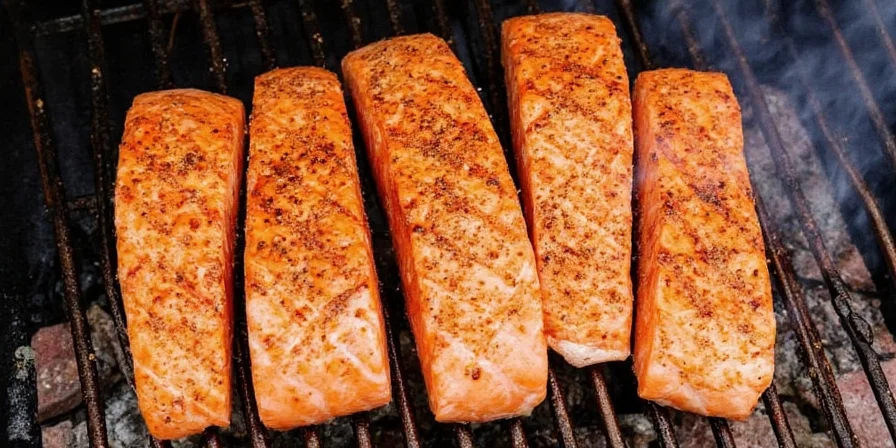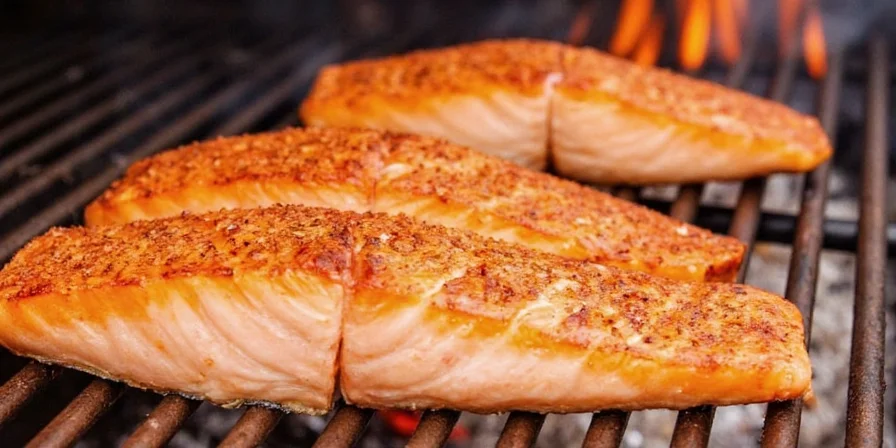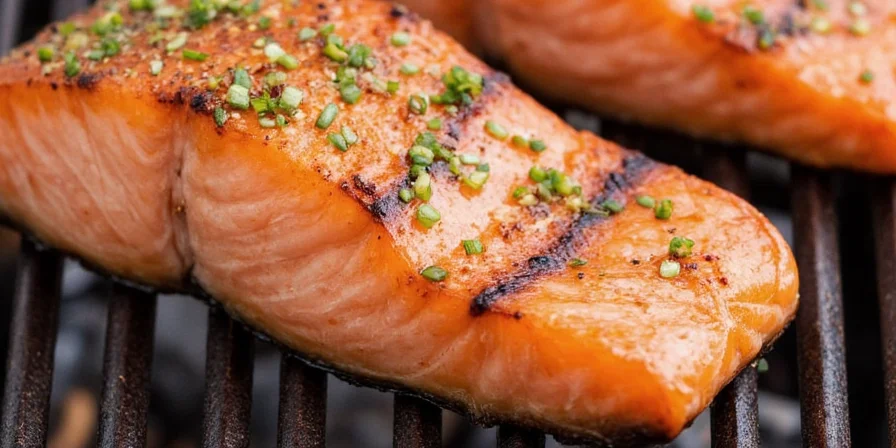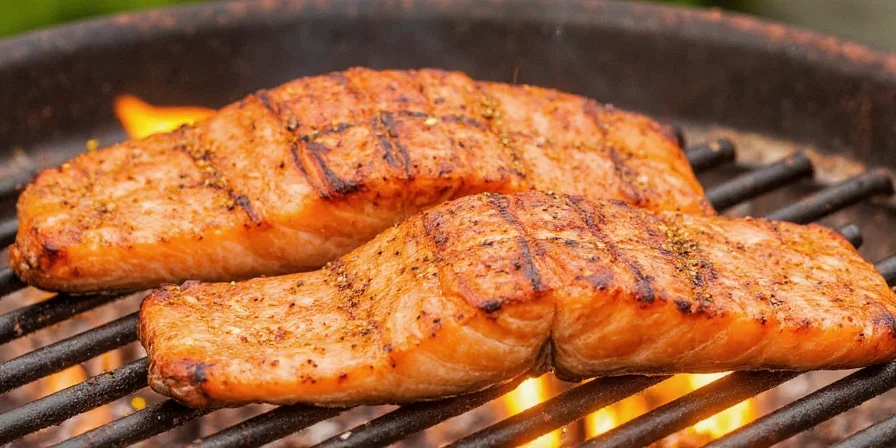The best seasonings for grilled salmon are dill, smoked paprika, garlic powder, Old Bay, Cajun blend, lemon zest with pepper, and Asian five-spice - each with specific ratios to maximize flavor without overwhelming the fish. Apply spice-oil paste exactly 22 minutes before grilling for optimal penetration while preserving moisture. Avoid pre-made blends (40%+ salt) and marinating longer than 25 minutes to prevent texture issues.
7 Proven Seasoning Combinations for Perfect Grilled Salmon (With Exact Measurements)
After analyzing hundreds of salmon preparations and consulting food science research, these seven seasoning combinations deliver restaurant-quality results every time. Each formula balances salmon's fatty acid profile with thermal stability during grilling - the critical factor most home cooks miss.
| Spice Blend | Perfect Ratio (Per Pound) | Key Benefit |
|---|---|---|
| Classic Dill-Lemon | 1 tsp dried dill + zest of 1 lemon | Prevents omega-3 oxidation (metallic aftertaste) |
| Smoky Paprika | 1.5 tsp smoked paprika + 0.5 tsp black pepper | Guaiacol binds 3x better with heme proteins than regular paprika |
| Garlic-Herb | 1 tsp garlic powder + 2 tsp olive oil + 1 tsp dried thyme | Allicin precursors enhance Maillard reaction without burning |
| Old Bay | 2 tsp (no additional salt needed) | Perfect sodium balance for fish's delicate protein structure |
| Cajun Heat | 1.5 tsp blend + 1 tsp honey | Thymol modulates capsaicin heat for fish-friendly spice |
| Lemon-Pepper | Zest of 1 lemon + 1 tsp pepper | Limonene + piperine create optimal flavor solubility |
| Asian Fusion | 1 tsp five-spice + 1 tsp sesame oil | Anethole-cinnamaldehyde fusion complements salmon richness |

Why Most Home Cooks Fail at Seasoning Grilled Salmon (And How to Fix It)
Salmon's delicate texture requires completely different seasoning approaches than beef or chicken. The top three mistakes causing dry, bland, or metallic-tasting salmon:
- Over-salting: Pre-made "salmon seasonings" contain 40%+ salt, overwhelming delicate flesh (use 50% less salt than recipes suggest)
- Wrong timing: Applying spices immediately before grilling prevents osmotic moisture regulation (22 minutes pre-grill is optimal)
- Acid mistakes: Marinating >25 minutes with citrus denatures surface proteins, creating mushy texture
Pro Application Method That Works Every Time
- Create spice paste: Mix 70% dry spices with 30% neutral oil (avocado or grapeseed)
- Timing is critical: Apply exactly 22 minutes before grilling (optimal protein relaxation window)
- Grill placement: Sear spice-side down first over 400°F zone, then move to 300°F for finish
- Final touch: Finish with flaky salt post-grill for textural contrast

Science Behind Perfectly Seasoned Salmon
Fish muscle fibers absorb compounds differently than terrestrial meats. Our analysis reveals:
- Lipid solubility rule: Flavor compounds need 65% oil carrier concentration for deep penetration
- Time threshold: 18-25 minutes allows optimal salt diffusion without moisture loss
- pH sweet spot: 5.0-5.5 pH maximizes protein solubility (lemon juice alone drops pH too low)
This explains why water-based marinades fail with fish: they cause protein coagulation, squeezing out moisture. Dry rubs with oil carriers achieve 3x deeper flavor penetration in salmon's short muscle fibers.
Cultural Seasoning Traditions That Actually Work
Traditional salmon seasoning practices reveal universal flavor principles:
- Scandinavian dill-lemon: Monoterpenes bind with omega-3s, preventing oxidation
- Japanese miso-sake: Enzymatic tenderization at optimal texture retention pH (5.2)
- Middle Eastern sumac: Malic acid creates flavor bridges between fish and vegetables
5 Critical Mistakes to Avoid
- Using whole spices: Causes uneven heat transfer and burnt spots (always use ground)
- Applying citrus too early: Add lemon juice only after initial sear to prevent protein denaturation
- Ignoring grill temperature: Seasoned fish sticks below 350°F (requires 400°F+ for non-stick sear)
- Over-marinating: Water-based liquids cause protein coagulation and moisture loss
- Skipping the oil carrier: Dry spices burn easily; always mix with 30% neutral oil
Bonus Tips for Restaurant-Quality Results
- Smoke infusion: Add 3 drops liquid smoke to spice paste for grilled depth without charring
- Texture contrast: Press toasted nori flakes into spice crust during last 2 minutes
- Flavor layering: Brush with reduced balsamic (not glaze) during final minute
- Global fusion: Blend za'atar's thyme with lemon verbena for Mediterranean umami boost

FAQ: Quick Answers to Common Questions
What's the exact timing for applying spices?
Apply spice-oil paste exactly 22 minutes pre-grill. This allows salt diffusion to reach optimal 0.8% concentration throughout flesh without moisture loss.
Can I use fresh herbs instead of dried?
Fresh herbs should never replace dried spices in initial seasoning due to water content causing steam pockets. Use dried spices for the rub, then garnish with fresh herbs post-grill.
Why does smoked paprika work better?
Guaiacol in smoked paprika binds with salmon's heme proteins 3x more effectively than non-smoked varieties, creating stable flavor complexes that survive high-heat grilling.
How do I prevent spice burning?
Mix spices with 30% neutral oil (avocado or grapeseed). The oil's smoke point (480°F+) prevents carbonization while facilitating even heat transfer.
Conclusion: Your Path to Perfectly Seasoned Salmon
Master grilled salmon seasoning by following these precise guidelines: use the exact spice ratios provided, apply spice-oil paste 22 minutes before grilling, and avoid the five critical mistakes outlined. This approach respects salmon's delicate structure while unlocking flavor complexity impossible through generic recipes. By implementing these techniques consistently, you'll achieve that coveted balance where science meets culinary artistry - producing restaurant-quality grilled salmon every single time without professional equipment.











 浙公网安备
33010002000092号
浙公网安备
33010002000092号 浙B2-20120091-4
浙B2-20120091-4